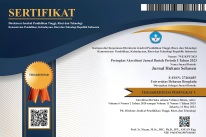Legal Protection Of Wage Rights For Honorary Workers In The Perspective Of Indonesian Civil Law
Abstract
The existence of honorary staff can be said to be still needed and not needed. Because in reality, in carrying out service tasks in government, both in the central government and local government, most of them are carried out and carried out by honorary employees where they are appointed by each agency and Regional Work Unit (SKPD). The purpose of this research is to find out the Legal Protection of Wage Rights for Honorary Workers in the Perspective of Indonesian Civil Law. The research method used is normative legal research in the form of library research which is carried out by collecting legal materials both primary, secondary and or tertiary. The results of research and discussion show that honorary or contract workers whose existence is rampant today both in the public sector or government agencies as well as in the private sector or business entities known as outsourching workers, ironically their existence is not massively protected and not strictly regulated by law in Indonesia. In fact, honorary or contract workers in Indonesia are implied in two categories. Based on the explanation above, there are several things, namely: 1. there is a legal vacuum (vacum of norm) on the protection of honorary or contract workers in Indonesia. 2. there must be a legal breakthrough on the settlement of wage disputes in honorary or contract workers. 3. civil procedural law as the foundation of formal law must be able to answer the problem of wage disputes of honorary or contract workers in Indonesia.
Downloads
Copyright (c) 2024 Sela Nopita Sari, M. Arafat Hermana, Dwi Putra Jaya, Sandi Aprianto

This work is licensed under a Creative Commons Attribution-ShareAlike 4.0 International License.






